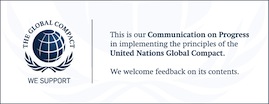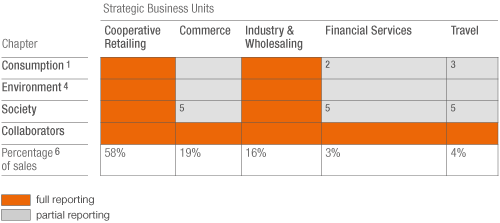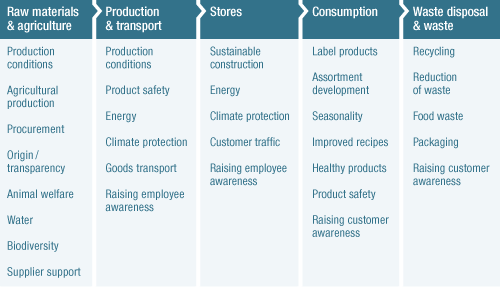Principles of Sustainability Reporting
Sustainability reporting is part of the Annual Report. In this reporting, Migros discloses its main economic, ecological and social contributions in accordance with the GRI standard.
Migros has published a sustainability report every year since 2004. The sustainability report has been published as part of the online Annual Report since 2009. The content of this report relates to the 2012 financial year (1 January to 31 December 2012). The publication date is 9 April 2013. The information on Migros' ecological and social contributions can be found mainly in the area entitled «Our Responsibility». The statements predominantly refer to the two business areas of Cooperative Retailing and Industry & Wholesaling. The editorial deadline for the key indicators was 26 March 2013. As some environmental key indicators will not have been finalised at this moment in time, there may be an update after the publication date. Key indicators updated after the publication date will be highlighted accordingly.
Reporting in accordance with GRI and Global Compact
Migros' reporting is guided by the specifications of the Global Reporting Initiative GRI (G3). The GRI is a multiple-stakeholder dialogue and develops globally recognised guidelines for sustainability reporting. The GRI certifies that the report has a compliance at level B.
You can find the GRI Content Index here.

Global Compact progress report
The Global Compact of the United Nations UNGC is a voluntary business initiative. It includes ten principles based on the generally acknowledged values of good corporate management. By joining the UNGC in 2006, Migros committed itself to working towards universally accepted principles of human rights and labour law, while promoting environmental protection and fighting corruption and ensuring that this is observed in its entire area of influence.
This Annual Report acts as a progress report within the meaning of the UNGC. The GRI Content Index provides information on the fulfilment of the ten principles.
Reporting limits
All details in the 2012 Migros Annual Report refer to the Migros Group. An exception is the «Our Responsibility» section. Various key indicators and statements in the subsections Sustainable Consumption and Environment relate predominantly to the following two strategic business units:
- Cooperative Retailing: branches and operating centres of the ten regional Migros Cooperatives, the Federation of Migros Cooperatives and the national distribution centres of Neuendorf and Suhr
- Industry & Wholesaling: 14 Migros industrial enterprises in Switzerland as well as the Scana wholesaler
In 2011 the Executive Board of the Federation of Migros Cooperatives made decisions that have allowed for a gradual expansion of sustainability reporting to the Migros Group since 2012:
- Basic social and ecological requirements were introduced for all companies from the strategic business units Commerce and Industry & Wholesaling. In an initial step, an analysis was conducted for 18 companies to determine which of the identified issues are relevant. Based on this analysis, the rolling implementation of the basic requirements was started in 2012. The progress report shows the current status of the implementation with selected examples. The task will be completed in 2013 and additional Migros companies will be involved in the implementation process.
- All companies of the Migros Group are gradually being incorporated into the energy and environmental management. For the first time, the Energy & Climate section also presents relevant key indicators energy consumption and CO2 emissions for the companies in the strategic business units Commerce, Financial Services and Travel.
The section «Our Responsibility» covers the following topics and business units:

1 Basic social and ecological requirements for all companies of the Migros Group: /2012/en/our-responsibility/sustainability-and-migros/progress-2012
2 See Migros Bank website: http://www.migrosbank.ch/de/Ueberuns/Portraet/nachhaltig_erfolgreich.htm
3 See Hotelplan Switzerland website: http://www.hotelplan-suisse.ch/de/nachhaltigkeit/nachhaltigkeit.aspx
4 Expansion of environmental and energy management to all companies of the Migros Group: /2012/en/our-responsibility/environment/energy-and-climate
5 See website of the Engagement Migros development fund http://www.engagement-migros.ch/en/index.php
6 Measured by: net revenue from sales of goods and services before elimination of group-internal net revenue. Migros Bank: income from financial services business
Internal review and external assurance
Mitreva Interne Revision AG has reviewed the statements and key indicators in the Annual Report, as well as the degree to which the objectives of the Generation M sustainability programme were met. As the internal auditor of the Federation of Migros Cooperatives (FMC), it performs independent and objective auditing and consulting services. Mitreva reports directly to the Audit Committee of the FMC's Board of Directors. Mitreva conducts its audits in accordance with the International Professional Practices Framework (IPPF) of the auditing profession.
The CO2 intensity and energy efficiency environmental key indicators are audited annually by the independent Energy Agency for the Economy (EnAW). In addition, the Swiss Federal Office of Energy (SFOE) and the Federal Office for the Environment (FOEN) conduct implementation audits at selected businesses.
Inclusion of stakeholders and determination of the relevant issues
For the selection of the relevant issues, a survey was conducted among external and internal stakeholders in autumn 2012. This inclusion of stakeholders in the reporting process makes the issue selection more transparent, helps make the report more complete and thereby increases its creditability. At the same time, it is intended to take more account of the interests of the Migros sustainability report's target group. Internal sustainability experts as well as representatives of selected national NGOs and interest groups from the areas of environment and consumption took part in the survey. The participants were able to share their opinions on the completeness and reader-friendliness of the report and also assess the relevance of various issues. On the basis of the feedback, various changes were made to this year's report: The report focuses more strongly on relevant issues; for further information, readers are referred to the Migros website at various points; the cooperation with suppliers and other partners is shown in different chapters; furthermore, the Food Processing sector supplement has been added to the GRI Content Index.
The following image shows the relevant issues along the value-added chain:
